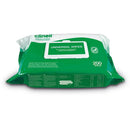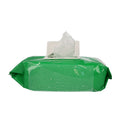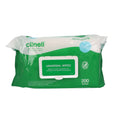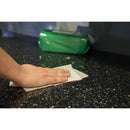Description
The UK’s most trusted single-step detergent and disinfectant wipe; ideal for surface disinfection and cleaning of non-invasive medical devices. Our patented near-neutral pH formula ensures exceptional material compatibility and kills at least 99.99% of germs after 10 seconds, norovirus within one minute and reduce instances of MRSA by 55%.
Clinell CW200 Frequently Asked Questions
Where can Universal Wipes be used?
Universal Wipes are safe to be used on all surfaces. They will not damage rubbers, plastics or metals. Though alcohol-based wipes tend to damage materials after prolonged use, our patented, pH neutral formula ensures that this will not occur with Clinell Universal Wipes. Alongside surfaces, Universal Wipes can be used on all non-invasive medical devices. If you are unsure about whether the wipes are suitable to use on a particular object or surface please call a member of our sales team, who will be happy to assist. Always follow medical equipment manufacturer's cleaning procedures and guidelines
Why is the product referred to as a Universal Wipe?
The wipes function as both disinfectant and detergent. They can also be used on all surfaces and all ward-based equipment
Why does it have a single use symbol on a pack of multiple wipes?
Each individual wipe is single use. This prevents the transfer of pathogens between surfaces or from one medical device to another
What are the active ingredients in Clinell Universal Wipes?
The formulation in Clinell CW200 Universal Wipes is a patented, antimicrobial solution developed by GAMA's Research & Development Department. It contains multiple different biocides including two quaternary ammonium compounds and one polymeric biguanide designed to work synergistically. The effectiveness of the biocides is increased by many multiples when they are used together. This, in turn, ensures that the wipe has wide antimicrobial activity and a high kill count. In addition, the wipe contains surfactant (to act as a detergent) and a chelating agent
What does the term "contact time" mean?
"Contact time" is the time required for the disinfectant to act on pathogens. Essentially: how long it takes for the disinfectant to work. With liquid disinfectants, the contact time requires the disinfectant to remain wet on the surface in order for it to work effectively. The contact time can vary depending on the micro-organisms involved
Does the mechanical action of the wipe play an important part in the disinfection process?
The mechanical action of wiping removes soil and bioburden allowing the disinfectant to reach the surface and kill any remaining microorganisms directly. The bioburden that remains on the wipe is killed by the disinfectant that remains on the wipe.
Where was the testing conducted for this wipe?
The tests mentioned have been conducted at various UK and European university accredited laboratories, according to test methods outlined by the European Union. All results are validated
Are there any special disposal requirements?
Used wipes should be disposed of in the clinical waste bin as per your infection control policy. Maceratable Wipes can be disposed of in a macerator
Why is it important to clean in addition to disinfecting?
Dirt creates a barrier between a surface and the disinfectant on the wipe therefore prevents the surface from being disinfected. Clinell Universal Wipes are designed to remove both dirt and disinfect at the same time meaning detergent and disinfectant wipes no longer need to be bought as two separate products.
Does using disinfectants increase the chance of resistance occurring with pathogens?
No, there is no risk of resistance occurring due to long-term use. This is because Universal delivers a high concentration of multiple different biocides each of which uses a differing mechanism of action, preventing resistance
Why is the kill count important to know?
Apart from how fast it takes a disinfectant to work (i.e. contact time), it is also important to determine how many of a particular microorganism have been killed. A fast contact time would count for nothing if it allowed the majority of the microorganisms to remain active. This reduction in microorganisms or “kill count” is expressed in a log form. Put simply, the log number is the number of 9s expressed in a percentage reduction. For example: 2 log reduction is 99%, 4 log reduction is 99.99% and so on. Clinell Universal Wipes have demonstrated a 5 log kill count (99.999%) for most pathogens in the contact time specified.
Does the wipe retain some of the disinfectant?
Generally, wipe materials contain certain molecules that can hold and lock the wipe formulation into the wipe itself, preventing release. In other words, the disinfectant liquid that is put into a wipe is not the same as when extracted off a wipe. Therefore, testing must be carried out on the run off from the wipe rather than the formulation itself. GAMA Healthcare is one of the very few companies to ensure that the accredited laboratories who complete our independent testing do so on the run off from the wipes.
What products do these wipes replace?
Universal Wipes are able to replace all detergent and disinfectant surface wipes (except for Peracetic Acid Wipes) and by doing so will help standardise wipe usage in a hospital, saving time, money and preventing confusion about the type of wipe required for each cleaning task. They are also able to replace medical device wipes (for use on non-invasive medical devices).
How would you summarise the benefits of Clinell Universal Wipes?
As the name suggests, Clinell Universal Wipes have a wide range of applications. Not only are they a single-step detergent and disinfectant wipe but they are suitable for all ward-based surfaces and all non-invasive medical devices. This allows hospitals to replace multiple products, saving money and simplifing their infection prevention policies. The wipes have a broad range of antimicrobial activity and are able to kill many pathogens within a very fast contact time and with a very high kill count. The efficacy of the wipes is backed-up by an extensive data package
Clinell CW200 Universal Wipes Efficacy Information
| Effective Against | Test | Kill Time |
|---|---|---|
| Bacteria | ||
| Acinetobacter baumannii | EN13727 | 10 sec |
| Enterococcus faecalis | EN13727 | 10 sec |
| Enterococcus faecium (VRE) | EN13727 EN14561 |
10 sec 1 min |
| Enterococcus hirae | EN13727 EN14561 EN16615 |
10 sec 1 min 5 min |
| Escherichia coli (E. coli) | EN13727 | 20 sec |
| Klebsiella pneumoniae (ESBL) | EN13727 | 10 sec |
| Methicillin Resistant Staphyloccus aureus (MRSA) | EN13727 | 1 min |
| Pseudomonas aeruginosa | EN13727 EN14561 EN16615 |
10 sec 1 min 5 min |
| Staphylococcus aureus | EN13727 EN14561 EN16615 |
10 sec 1 min 5 min |
| Mycobacteria | ||
| Mycobacterium bovis | EN14348 | 2 min |
| Fungi | ||
| Candida albicans | EN13727 | 10 sec |
| Candida auris | EN13624 | 1 min |
| Virus | ||
| COVID-19 (SARS-CoV-2) | EN14476 | 30 sec |
| Hepatitis B | ASTM E1052 | 1 min |
| Hepatitis C | EN14476 | 1 min |
| HIV | EN14476 | 30 sec |
| Influenza H1N1 | EN14476 | 2 min |
| Influenza H3N2 | EN14476 | 2 min |
| MERS-CoV | EN14476 | 1 min |
| Norovirus | EN14476 | 1 min |
